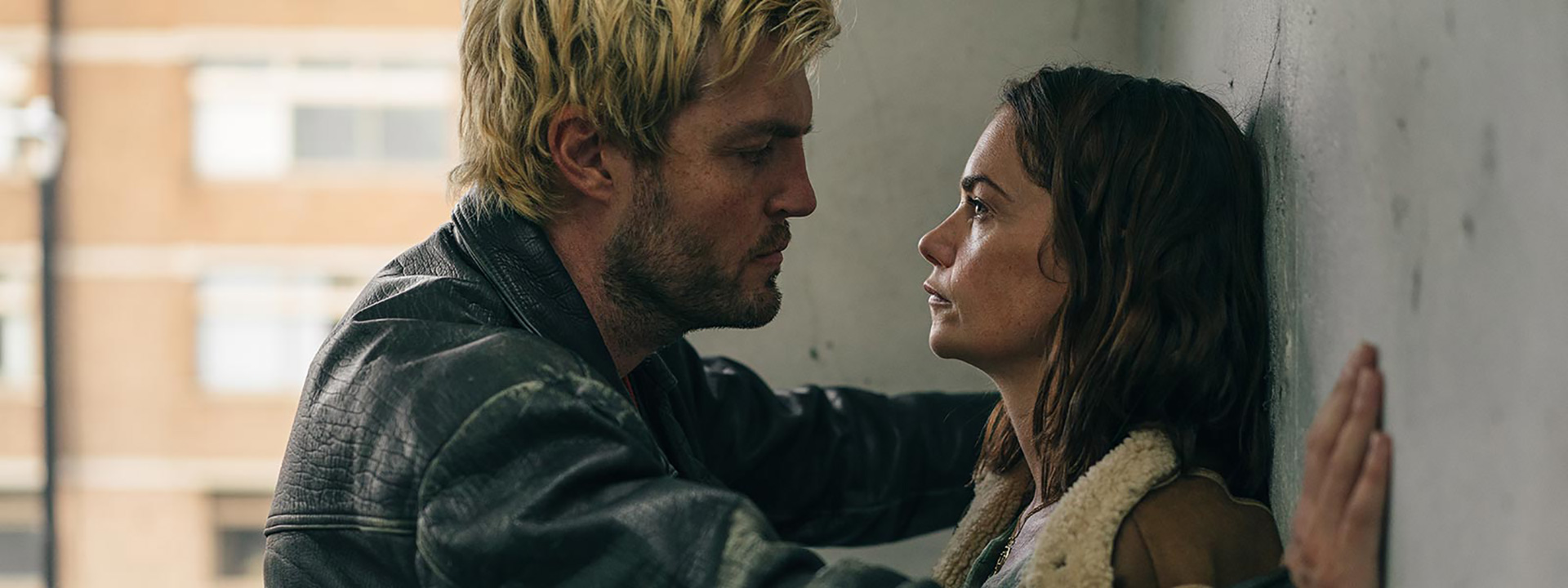Kate (Ruth Wilson) is listless. She works a dead-end workers’ claim desk wherein her bosses are so redundant that they don’t think they’re doing their job unless chastising their employees for not bringing in doctor notes. Her best friend Alison (Hayley Squires) is too busy with her kids to provide stimulating entertainment beyond a couple of drinks at their local. And the only place she really has at her disposal to escape these doldrums is her parents’ home so Mum (Elizabeth Rider) can remind her about all the women her age having babies and Dad (Frank McCusker) can pawn off the vegetables he grows. It therefore means something when a client applying for assistance flirts with her instead of spitting the usual personal insults. It truly means a lot.
What Kate doesn’t yet realize, however, is that the excitement Blond (Tom Burke) brings her life is less about him than it is her. That’s the crux of the matter here, considering he’s a real piece of work: an enigmatic figure who pushes boundaries, says wonderful things, and ultimately turns into a right bastard when not getting his way or getting it and having no more use for the person who complied. So while he does unlock something inside Kate that hasn’t climbed to the surface in quite some time, he also provides a perfect example of why she retreated in the first the place. The question then becomes whether his influence in blowing up her monotonous life was worth the inevitable pain of giving him her love.
Adapting a book by Deborah Kay Davies, director Harry Wootliff and her co-writer Molly Davies bring True Things to life as a quasi-reaction to Instagram captions generally painting a much sunnier picture than reality could ever prove. The sad truth is that the activities Kate would probably write on photos of her visiting Nan or babysitting Alison’s kids wouldn’t actually be true. To look at her life as it was before Blond walks in is to see a melancholic existence devoid of any drive to seek better. The simple reality that she dares to date a client of his checkered past has Alison wondering what’s going on because it’s “not like her.” Yet by the look of Kate’s expression, it should be. She craves the adventure.
That doesn’t mean embracing it will be easy, though. Not after living on the fringes for so long. She must therefore lean on Blond like training wheels, adopting a co-dependent dynamic that he rejects right from the start with smug derision. She believes she needs him to feel alive anyway. He knows where the parties are. His lack of inhibition cajoles her into taking off her knickers in the parking garage of her office. His unbridled confidence allows her to feel safe doing drugs amongst strangers because she isn’t alone. Unless, of course, he disappears without warning. Suddenly his commonly abrupt absences force her to second-guess her inclusion. Kate starts feeling like the third wheel of her own romance. And then he returns to restart the cycle again.
It’s a volatile and exploitative relationship that the material neither ignores nor showcases as the central tenet of the whole. Why? Because it’s not about Blond. He isn’t important beyond what his presence unlocks. This isn’t a love story nor a commentary on gaslighting men; it’s a sexual and identity-driven awakening. That’s not to condone what goes on as though its ends justify the means. They don’t. But that reality is implicit to the acts themselves. We know Blond is a piece of work who shouldn’t be given the benefit of the doubt because he had a rough childhood. Kate’s eventual awareness of that truth proves enough to accept his role without explicitly glorifying or demonizing it. She won’t be so easily fooled next time.
It’s a full-frame whirlwind of emotions as the shy Kate peeks out of her shadows to eventually rip down the wall that’s been blocking the sun. Wilson is fantastic throughout, especially in these transitional moments where Blond helps coax the version of herself that she wants to be regardless of what those around her believe. She’s been so inundated with demands on who she must become to be successful and “worthy” that her inability to meet those standards (or even want to try) has gotten her to self-label herself as a failure. Blond sees behind that façade, though. He not only exposes the real Kate to the world, but also to herself. And there’s no better proof than a blind date wherein she takes full control.
That there are no huge explosive moments for the trailer—even when Kate does confront Blond about his penchant for taking advantage of her, she delivers it with a meek, doesn’t-want-to-rock-the-boat-in-public demeanor—might have you wondering about the point, but I think that is exactly it. How she picks herself back up and puts herself in a position to turn the tables isn’t a reaction against him, but a cathartic coming out party for her. We don’t therefore need to hate Blond. We nothing him. It’s Kate that earns our attention. And it’s Kate who decides enough is enough with following the rules. By then she doesn’t need anyone to serve as her emotional crutches. She finally knows what she wants and acquires it without remorse.
True Things played at the Toronto International Film Festival.

